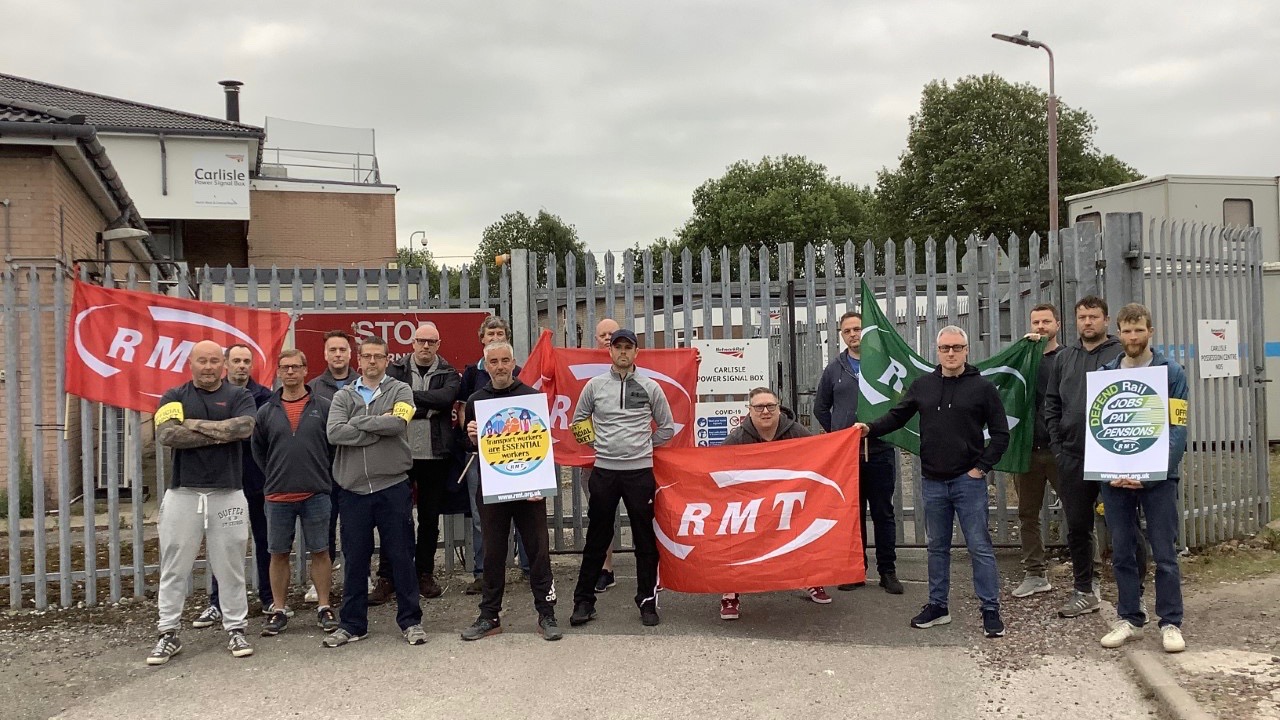As working class sections and low income households in the UK are suffering from the ongoing cost of living crisis, rail workers are organizing a massive mobilization against proposed austerity measures and job cuts. Over 50,000 rail workers of 13 train operating companies and the London Tube began a strike action on Tuesday, June 21, under the leadership of the National Union of Rail, Maritime and Transport Workers (RMT) demanding higher wages at par with the soaring inflation and protesting against the job cuts that will result from the austerity policies proposed by the authorities. The strike continued on Thursday, June 23, and the workers will again go on strike on Saturday, June 25. Progressive sections in the UK, trade unions like Unite the Union, and groups including ACORN UK, Young Communist League (YCL-Britain), Communist Party of Britain (CPB), and Socialist Party, among others, have expressed solidarity with the rail workers’ strike.
Rail workers and the other working class sections, already distressed by the COVID-19 crisis, are now being pushed to the brink by the ongoing cost of living crisis marked by skyrocketing fuel and food prices. On top of that, the Tory government has decided to cut £4 billion (USD 4.89 billion) of funding from transport systems – £2 billion (USD 2.44 billion) from the national rail and £2 billion from Transport for London – which is likely to add to the precarity of rail workers’ jobs. Such austerity driven policies are likely to result in forced redundancies in the sector, which will also affect necessary services like security, sanitation, catering and ticketing in the rail networks. RMT has stated that most of the rail workers are earning just between £25,000 (USD 30,500) to £31,000 (USD 37,820), around the national median annual salary of £31,285 (USD 38,167), while the rail bosses have taken £1 million (USD 1. 22 million) as pay packets and companies have made in excess of £500 million a year in private profits since the start of the pandemic.
London Tube workers had organized warning strikes earlier in March against the austerity measures. At the time, the pro-government mainstream media tried to malign the protest, calling the trade unionists pro-Putin saboteurs within the UK. Even now, the Tory government and several media houses have resorted to slanderous charges against the workers. There are also moves to recruit temporary workers to rail networks in order to break the strike.
The Morning Star editorial on June 22 stated that “since the 2008 capitalist crisis, workers in Britain have been locked in a system of static wages. The nonsensical notion that it is workers’ “irresponsible” wage claims that fuel inflation cannot explain a present-day inflation rate of 11%.”
Commenting on the strike action on Tuesday, RMT General Secretary Mick Lynch said, “today’s turnout at picket lines has been fantastic and exceeded expectations in our struggle for job security, defending conditions and a decent pay rise. Our members will continue the campaign and have shown outstanding unity in pursuit of a settlement to this dispute.”
“RMT members are leading the way for all workers in this country who are sick and tired of having their pay and conditions slashed by a mixture of big business profits and government policy. Now is the time to stand up and fight for every single railway worker in this dispute that we will win,” he added.
In a tweet on June 21, Labour MP Jeremy Corbyn expressed solidarity with the rail workers and stated, “we cannot let the profits of the rich continue to grow at the expense of workers’ jobs, wages, conditions, pensions and safety.”
Major mobilizations were also organized earlier by the People’s Assembly Against Austerity and the Trade Union Congress (TUC), with tens of thousands of people protesting against the Tory government’s failure to tackle the cost of living crisis. Anti-worker policies by companies, such as the expulsion of 800 workers by P&O ferries without any notice, has also triggered widespread outrage within the British working class.





